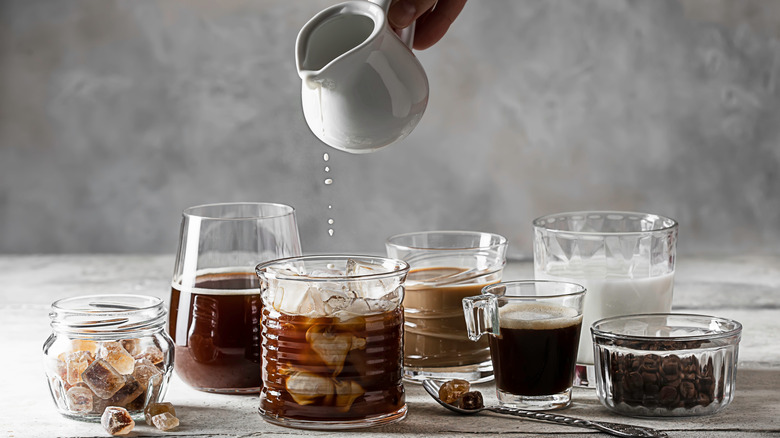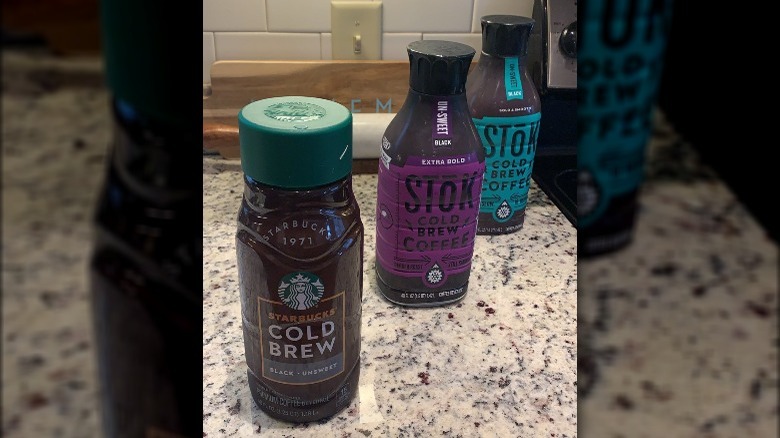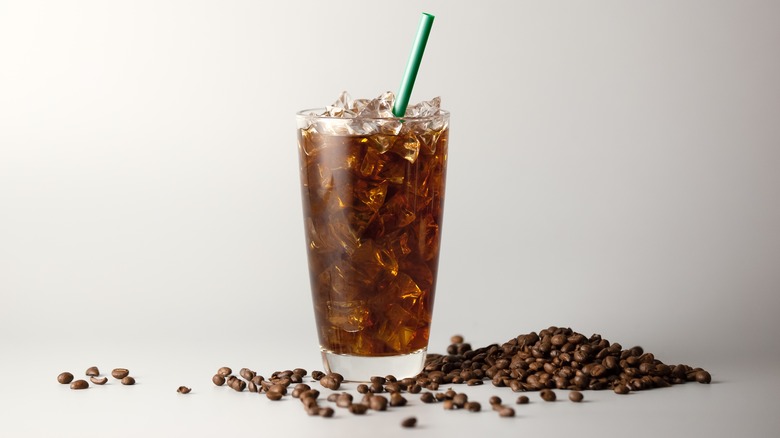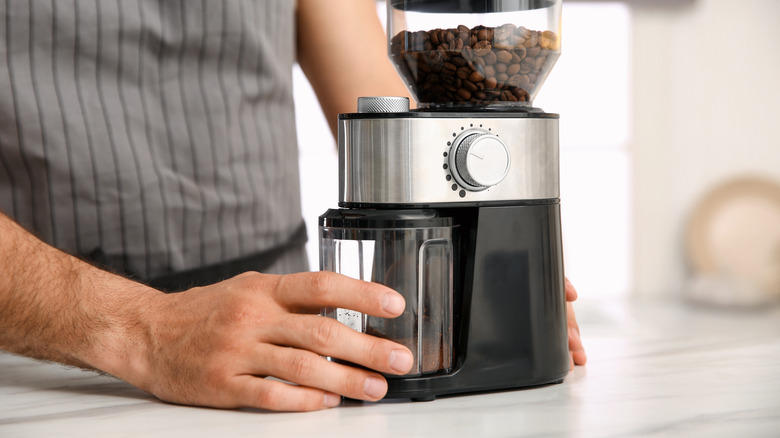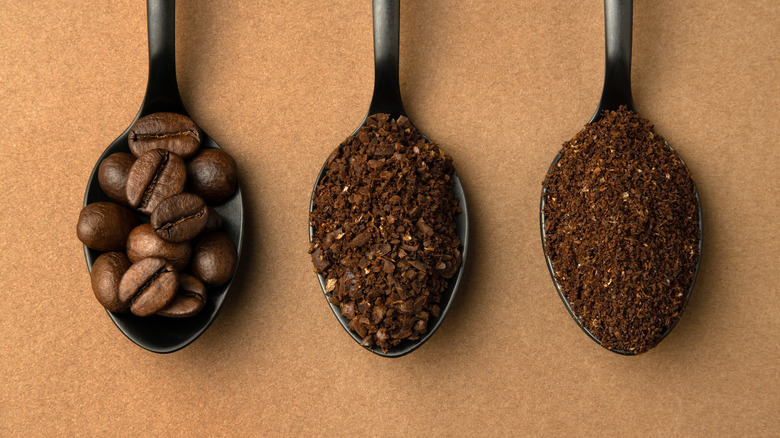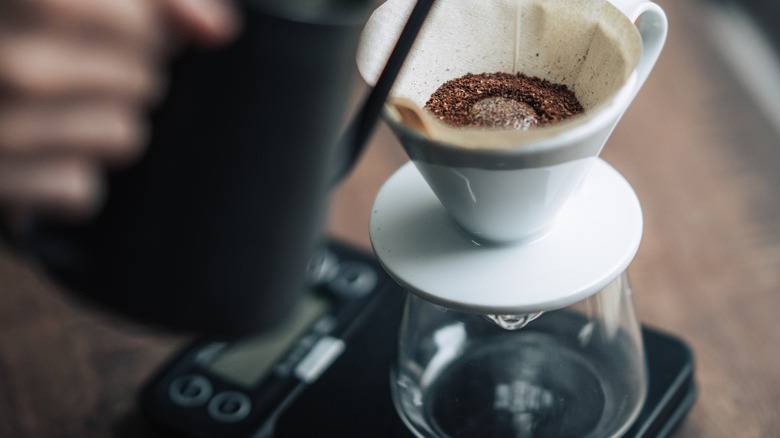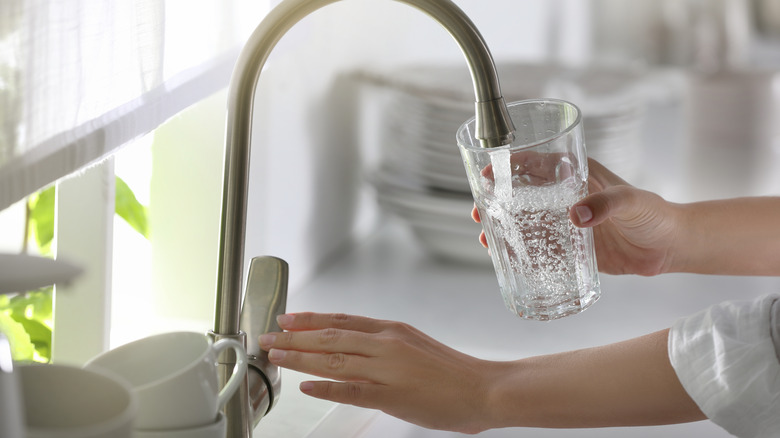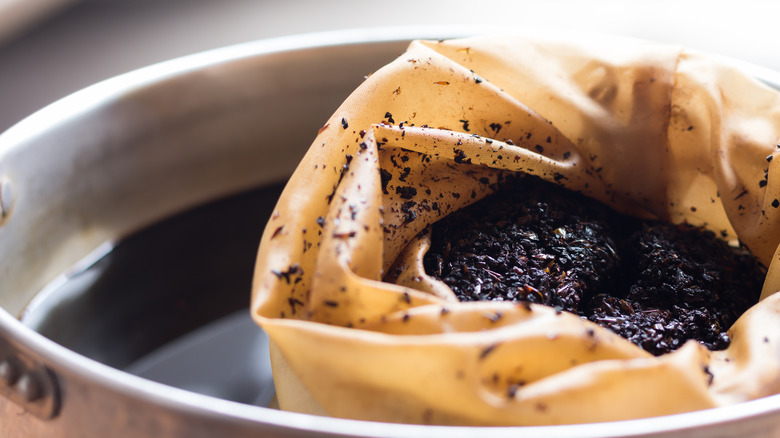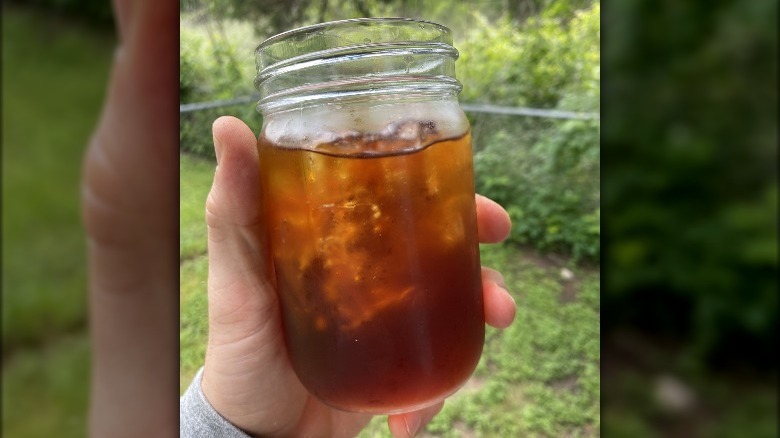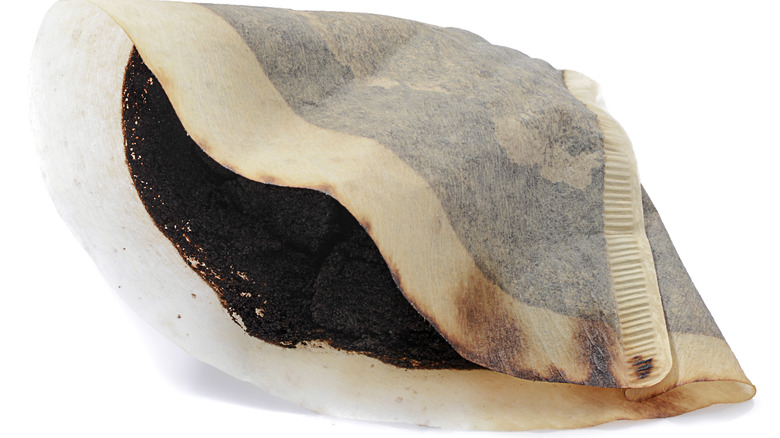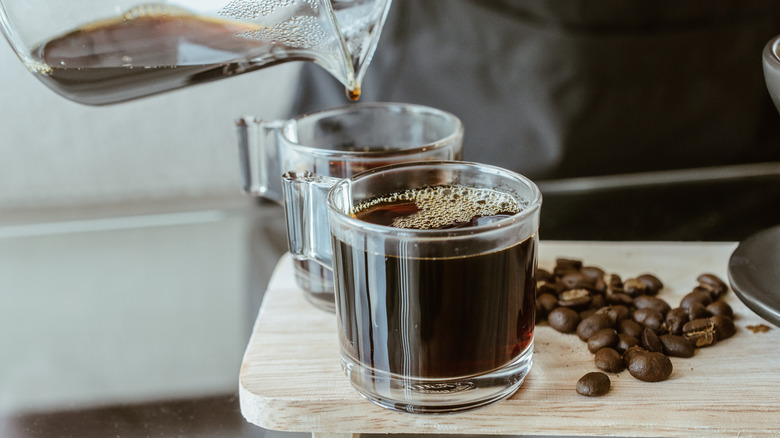Avoid These Common Mistakes When Crafting Your Own Cold Brew
Coffee fans sure love their cold brew. Millennials in particular are obsessed, with sales dramatically increasing over the last few years. Whether it's something to do with cold brew coffee having more caffeine in than you might think — and let's be honest, we all need a boost in the morning — it now seems to be as popular and mainstream as your regular old cup of Joe. But don't make the mistake of assuming all cold coffees are equal. In fact, there is one key difference between cold brew and iced coffee. Making iced coffee simply involves pouring hot coffee over ice, but cold brew — as the name implies — is made without heating up a single bean.
The process of how to make the perfect cold brew is more intricate than you might think, and there are several steps along the way where you may encounter common pitfalls. If you're on a mission to master cold brew, or if you're looking for ways to reduce your spending on a morning trip to your local coffee shop, here are some common mistakes you'll want to avoid.
Buying pre-made grocery store cold brew
In our busy lives, it can be tempting to make every part of our routine as convenient as possible. While there's an argument to be made for streamlining the coffee process (especially if it's a ritual you partake in daily), your first mistake is buying it pre-made at the grocery store. Several brands mass produce cold brew products, cutting out all of the work that goes into making it. And while there are some great grocery store cold brew coffees out there, there's one big drawback — the cost.
You stand to save money by making your cold brew coffee at home. It could be as much as 75% cheaper compared with buying cold brew at a local coffee shop. Workweek Lunch went deep on the math and realized you could save up to $150 a month by making your own. While it may take some time to perfect your formula to yield a cup as tasty as your favorite café, your wallet will thank you.
Choosing the wrong coffee beans
Once you've decided to start making your own cold brew at home, the first step is choosing your coffee beans. You want to make sure you are selecting the best beans possible for the task. While there are various opinions on which bean is the most ideal for cold brew, it will ultimately come down to personal preference.
If you want to turn to experienced cold brew aficionados to hear what they prefer, look no further than Reddit. One coffee buff says that while light and dark roast beans can do the job, you might need to wait longer for a light roast, and be careful not to over extract if using a dark roast. According to Golden Ratio, medium or dark roast beans are optimal. This is a sentiment echoed by Your Dream Coffee, which suggests "the richer, bolder, chocolatey flavor profile of dark roasts make for a better cold brew."
Not having the right tools on hand
The equipment you use in the kitchen is important, whatever you're trying to make, and your coffee is no exception. For homemade cold brew, there are a couple of tools you will need to have on deck. The first is a coffee grinder, and we'll sure you'll want the best. However, best doesn't mean you necessarily need a grinder with lots of bells and whistles. The most important thing you'll need is a consistent grind, so you might want to avoid blade grinders (which resemble a plane propeller), as these tend to grind the beans unevenly.
The next tool you need is something to actually brew the coffee in. Counter Culture Coffee points out that you don't need an entire cold brew system, although they do exist and some may prefer a tool specifically designed for the intended purpose. A sealable container is really all you need, whether it's a French press, mason jar, or even plastic food storage box. Test out various tools you already have in your kitchen to see what works best.
Grinding your coffee too fine
When it comes to preparing your coffee beans for cold brew, a common mistake some beginners make is grinding their coffee too fine. Golden Ratio recommends a coarse grind. That tip is echoed throughout multiple experts and experienced home brewers we came across. If the coffee is too finely ground, it will turn out bitter. It's also not worth using finely ground coffee you already have at home when making cold brew.
One Redditor pointed out that using finely ground coffee beans will actually produce a weaker flavor and mean your cold brew has less caffeine overall. Across the board, those who have had ample experience with making cold brew from scratch strongly advise others to make sure they are using coarse coffee grounds, and that the difference will be noticeable (and not in a good way). However, if you do use finely ground coffee, you can always mask the taste with milks or syrups.
Using the wrong water to coffee ratio
Perhaps the most consequential step in making your batch of cold brew coffee is achieving the right ratio between your ground coffee and water. This has a big impact on the overall flavor and intensity, and messing it up can have disastrous results.
Like some of the other steps in the process, your ideal water to coffee ratio may depend on how strong you like your coffee. For most beginners, Counter Culture Coffee recommends a ratio of 1:8. That is, 1 gram of coffee grounds for every 8 grams of water. You can tweak your ratio from there depending on how strong you want your cold brew to be: Stronger brews need less water for each gram of coffee, while lighter brews will require more water.
The ratio can be scaled up or down depending on how much cold brew you want to make, too. One cold brew enthusiast with 10 years' experience shared their perfect ratio for making cold brew: 180 grams of coffee in 1 gallon of water, which would make enough coffee to last a week.
Not using the right water
If you're just starting out, this step may not feel as crucial, but as you look to perfect your cold brew recipe, the kind of water you use may wind up playing a big part in your process.
Maya Zuniga, director of product innovation for S&D Coffee and Tea told Fresh Cup that the cleanliness of water, and its mineral make up, is a really important factor to consider when making cold brew. In fact, the water choice should be viewed as important as the choice of coffee beans. One Redditor uses room temperature tap water, and advises others not to use mineral water. On the other hand, one Redditor points out that tap water may contain added properties like fluoride and chlorine that can affect the taste of your coffee, so they advise sticking to bottled water. Experiment with different kinds of water as you craft the perfect cold brew recipe to see what kind you prefer.
Not waiting long enough for the grounds to steep
Once you have your coffee grounds and water, it's time to let the mixture steep. Golden Ratio defines cold brew as a coffee that has steeped for at least four hours, but in reality you will likely need to leave your coffee for longer to achieve the best results. Golden Ratio suggests waiting anywhere between 12 to 24 hours, depending on how strong you want the concentrate to be.
One Redditor suggests waiting even longer, saying 24 hours is fine, but that your cold brew will be on another level if you wait four days. Patience may be the most important ingredient in your cold brew making process. On average, expect your cold brew to steep for at least a day before it's ready for drinking, though you can start with waiting overnight and seeing if the 12-hour waiting period is long enough for your taste. Coffee Affection says the ideal waiting period is between 12 to 18 hours.
Not making a large enough batch
One of the benefits of making cold brew is the cost savings, so you will want to consider making enough coffee to last the week. Preparing homemade cold brew is also a time-consuming process, although most of the process is hands-off (via Golden Ratio).
How much do you need to prepare? One Redditor makes a gallon of cold brew each time they go through the process, which includes four measuring cups of coarse coffee grounds. This will easily last a week, if not longer. You could make smaller batches depending on your quantity of coffee grounds (and space!), but if you want to replace your daily trip to the coffee shop, you will want to look into making larger batches so you are not constantly waiting on your coffee to steep. Since it's not as simple as popping a pod into your coffee machine each morning, a larger batch will help cut down on time.
Not filtering the sediment out of your coffee
As you're dealing with coarse coffee grounds when making cold brew, you are going to be left with lots of excess remnants at the end of the steeping process. Because of that, you need to add an important step to your ritual to make sure you do not wind up with a cup filled with grounds.
Filtering your cold brew is a quick but important step you do not want to skip. There are various ways you can achieve it. According to The Woke Lark, you can use a cheesecloth, fine mesh coffee filter specially made for cold brew, fine mesh strainer, French press, or a special cold brew coffee maker.
Although filtering the grounds is technically optional, it really does help to ensure you have a clean cup of cold brew, and you aren't stuck chewing on coffee grounds. That's not how anyone wants to start the day.
Letting your cold brew sit in the fridge too long
If you are making more than a single serving of cold brew, you are going to wind up with a large container of coffee that will sit in your refrigerator throughout the week. But what does the shelf life look like for a batch? Like many of the other steps in this process, it depends. One Redditor mentions that if you are making a concentrate that needs dilution, it should last the week in a fridge.
Stumptown Coffee also notes that a fresh batch of cold brew should last at least one week, with Home Grounds suggesting it can last up to two weeks. After that, you'll want to feed it to your plants. With that knowledge, you can safely assume that making cold brew over the weekend can give you enough coffee to last the work week, and then you can make another fresh batch in time for Monday morning.
Not diluting your coffee when it's ready for drinking
Depending on the water to coffee ratio you use when making cold brew, you may wind up with something that's ready for drinking straightaway (cream, milk, and other flavors all optional, or try some alternative healthy ways to sweeten your coffee), or you may wind up with a concentrate. If it's the latter, you'll need to further dilute it before you drink it, or you will encounter a rather unpleasant taste.
For example, Counter Culture Coffee's guide to making cold brew results in a concentrate that would need further dilution before drinking. After brewing your concentrate, it advises adding more water. The exact amount of water added all depends on how strong you want your coffee. But do make sure you are not diluting your coffee too much, as Java Presse warns you could wind up with overly watered down coffee (and no one wants that).
